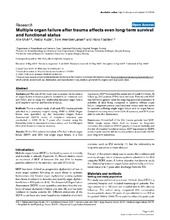Multiple organ failure after trauma affects even long- term survival and functional status
Original version
https://doi.org/10.1186/cc6111Abstract
Background The aim of this study was to assess the incidence of organ failure in trauma patients treated in an intensive care unit (ICU), and to study the relationship between organ failure and long-term survival and functional status. Methods This is a cohort study of all adult ICU trauma patients admitted to a university hospital during 1998 to 2003. Organ failure was quantified by the Sequential Organ Failure Assessment (SOFA) score. A telephone interview was conducted in 2005 (2 to 7 years after trauma) using the Karnofsky Index to measure functional status, and the Glasgow Outcome Score to measure recovery. Results Of the 322 patients included, 47% had multiple organ failure (MOF), and 28% had single organ failure. In a Cox regression, MOF increased the overall risk of death 6.0 times. At follow-up, 242 patients (75%) were still alive. Patients with MOF had 3.9 times greater odds for requiring personal assistance in activities of daily living compared to patients without organ failure. Long-term survival and functional status were the same for patients suffering single organ failure and no organ failure. Complete recovery occurred in 52% of survivors, and 87% were able to look after themselves. Conclusion Almost half of the ICU trauma patients had MOF. While single organ failure had no impact on long-term outcomes, the presence of MOF greatly increased mortality and the risk of impaired functional status. MOF expressed by SOFA score may be used to define trauma patients at particular risk for poor long-term outcomes.
